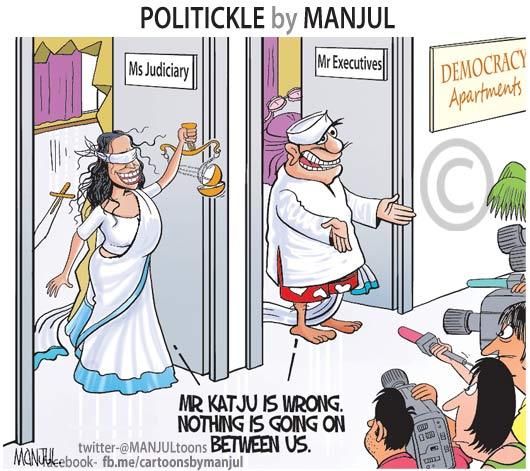The story about the elevation of a District judge to the Additional judge of High Court in Tamil Nadu during the UPA/DMK regime which was mired in corruption has been made public by Supreme Court judge Markandey Katju..It looks spicy..Also shows the level to which MMS Government allowed compromises in the judiciary...3 Chief Justices were involved..Despite all the opposition to the District judge elevation, he was elevated; shows the political might of the DMK & role of corruption during the UPA regime!
Three former CJIs made ?improper compromises?, alleges Katju - The Hindu
Former Supreme Court judge Markandey Katju, Chairman of Press Council of India, on Monday stirred a controversy by alleging that three ex-Chief Justices of India had compromised in giving extension to an additional judge of Madras High court at the instance of UPA government in the wake of pressure from one of its allies, apparently DMK.
Mr. Katju made the charge while alleging how the three former CJIs - Justices R. C. Lahoti, Y. K. Sabharwal and K. G. Balakrishnan - had made “improper compromises” in allowing the judge, against whom there were several allegations of corruption, to continue in office. “These three former CJIs made improper compromises. Justice Lahoti who started it, then Justice Sabharwal and then Justice Balakrishnan. These are CJIs who can surrender. Is a CJI going to surrender to political pressure or not going to surrender to political pressure?” Mr. Katju, who became the Chief Justice of Madras High Court in November 2004, told NDTV. Mr. Katju later became a Supreme Court judge.
Mr. Katju said since he got many reports that the additional judge concerned was allegedly indulging in corruption had requested the then CJI Justice Lahoti to get a secret IB inquiry made about him.
He claimed that the IB report found the allegations to be true and he should have been sacked.
Mr. Katju said since the two-year term as additional judge of that person was coming to an end he presumed he would be discontinued as Judge. “But to my utter shock I came to know he was been given another extension when an adverse IB report was there,” he said.
Mr. Katju said he came to know that the reason for all this was that at that time the UPA-I government was dependent on allies and one of them was a Tamil Nadu party, an apparent reference to DMK, whose leader was given bail by the additional judge concerned.
Three former CJIs made ?improper compromises?, alleges Katju - The Hindu
Former Supreme Court judge Markandey Katju, Chairman of Press Council of India, on Monday stirred a controversy by alleging that three ex-Chief Justices of India had compromised in giving extension to an additional judge of Madras High court at the instance of UPA government in the wake of pressure from one of its allies, apparently DMK.
Mr. Katju made the charge while alleging how the three former CJIs - Justices R. C. Lahoti, Y. K. Sabharwal and K. G. Balakrishnan - had made “improper compromises” in allowing the judge, against whom there were several allegations of corruption, to continue in office. “These three former CJIs made improper compromises. Justice Lahoti who started it, then Justice Sabharwal and then Justice Balakrishnan. These are CJIs who can surrender. Is a CJI going to surrender to political pressure or not going to surrender to political pressure?” Mr. Katju, who became the Chief Justice of Madras High Court in November 2004, told NDTV. Mr. Katju later became a Supreme Court judge.
Mr. Katju said since he got many reports that the additional judge concerned was allegedly indulging in corruption had requested the then CJI Justice Lahoti to get a secret IB inquiry made about him.
He claimed that the IB report found the allegations to be true and he should have been sacked.
Mr. Katju said since the two-year term as additional judge of that person was coming to an end he presumed he would be discontinued as Judge. “But to my utter shock I came to know he was been given another extension when an adverse IB report was there,” he said.
Mr. Katju said he came to know that the reason for all this was that at that time the UPA-I government was dependent on allies and one of them was a Tamil Nadu party, an apparent reference to DMK, whose leader was given bail by the additional judge concerned.

